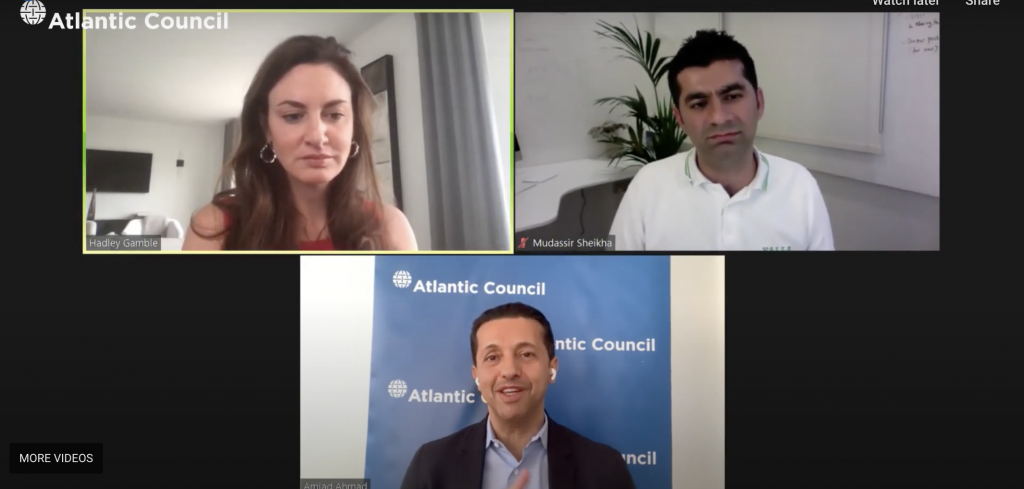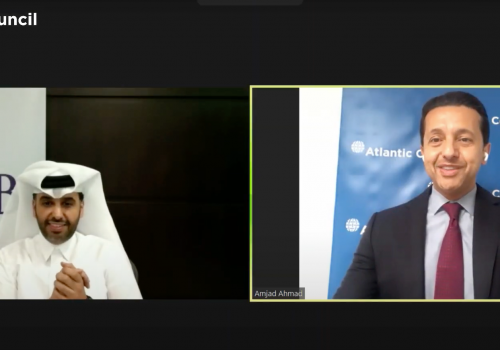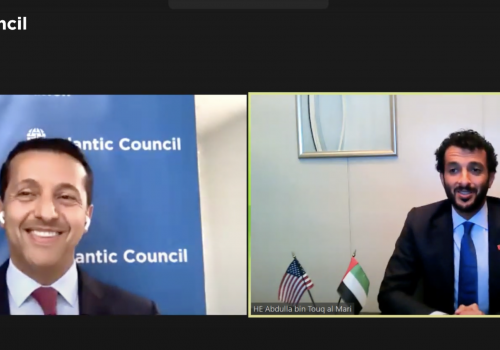On November 17, 2020, the Atlantic Council’s empowerME initiative hosted Careem Co-Founder & CEO Mudassir Sheikha and empowerME Director and venture capital veteran Amjad Ahmad for a conversation about Sheikha’s path to success and strategies for building a more productive entrepreneurial ecosystem to create more unicorns in the Middle East. Below are the key takeaways from the discussion moderated by CNBC Reporter & Anchor Hadley Gamble.
Challenges Careem and other start-ups in the region face
- Reflecting on the obstacles that Careem faced in becoming the region’s first unicorn, Sheikha advised fellow entrepreneurs to expect three high-level challenges: 1) access to funding, 2) access to talent, and 3) regional fragmentation.
- Ahmad specified that access to scale funding remains a critical issue although access to seed funding and early-stage funding has increased.
- Ahmad agreed with Sheikha that foreign investors shy away from the Middle East due to “the gap between real and perceived risks.” Foreign direct investment is lacking because the perception of the region is negative.
- In terms of talent, Sheikha explained that the lack of technological universities in the Middle East poses long-term problems to companies trying to find engineers, data scientists, architects, etc. locally. In the short term, new companies will likely need to lean on external tech hubs for support, as Careem did with its Berlin office.
- Government policy urgently needs to change to ensure that the local pool of skilled labor can catch up to businesses’ demand, Sheikha argued. Ahmad pointed to K-12 education as foundational for the region in transitioning from its current stage of adopting models for innovation to creating innovation for the rest of the world. Ahmad underscored the global challenge of educating youth in preparation for the jobs of the future, which may leave behind occupations that no longer exist.
- Regional fragmentation, which hinders a company’s ability to scale effectively, is at the heart of the other two obstacles for every startup: access to funding and talent. For some companies, fragmentation is an “existential problem,” according to Sheikha. Ahmad noted that the free movement of goods, services, capital, people, and data are a prerequisite before a significant amount of investment can come into the region.
Unique opportunities in MENA’s ecosystem
- The deficit of infrastructure in many parts of the region offers opportunities for startups to drive advancements at an even faster pace than more developed international hubs, according to Sheikha.
- Ahmad concurred that global companies’ choice not to invest heavily in the Middle East is a mixed blessing: development deficits can be a handicap but also a boon to local businesses that don’t face the same intensity of competition like in China or India.
- Sheikha emphasized the remarkable change in the mindset and ambition of aspiring entrepreneurs in the past five to eight years, celebrating that “the right mindset is there now.”
- “In the immediate term, the region has a lot of great human capital that we need to inject into the private sector,” recommends Ahmad. The participation of women in the economic sector must increase dramatically.
Scale financing
- “Scalability is something that we have to crack,” commented Ahmad, noting that substantial investment is necessary for companies to overcome serious scaling inefficiencies. Companies still struggle to raise scale capital of around $10-20 million, which is essential for them to expand regionally.
- Ahmad observed that the Middle East cannot build a great ecosystem without a very liquid capital market. Regulations in the next five to ten years will need to change to allow more tech companies to go public.
- Regulators and governments should focus on making the venture capitalist industry robust in order to increase funding for startups and for the power to shift from venture capital firms (VCs) to business founders.
- Sheikha stated that Series B and C challenges must be met before we see more exit options for businesses.
Social impact
- Upon founding Careem, Olsson and Sheikha committed to harnessing technology and digital advancements so that people across the Middle East could have access to necessities and thus attain a higher quality of life.
- Despite short-term business opportunities during the pandemic, the social consequences of Careem’s layoffs in the spring have been severe. Debt and the repatriation of workers from the United Arab Emirates are among the consequences. On the flip side, the regulatory environment has opened up slightly for drivers to make deliveries, marking one positive development of late.
- Sheikha stated that California’s recently passed Proposition 22 that considers app-based drivers to be independent contractors and not employees is “in some ways a win” that offers inspiration for Careem’s business model in the Middle East, as the court ruling upholds a “middle ground between an employee and a contractor.”
- Sheikha is committed to creating a safety net with healthcare and innovation components so that Captains (as Careem calls its drivers) can sustain themselves and prosper even though local regulations do not mandate that Careem provides these benefits.
- Ahmad highlighted the need to “control for unwanted consequences like inequality” even as the pandemic has a positive effect on the regulation of technological innovation, particularly in the fields of Fin-Tech and E-commerce.
Impact of COVID-19 on business
- “Covid has been an accelerator for digital transportation,” Sheikha explained. “A lot of the commercial activity that was happening in the offline world less efficiently is now moving faster than ever digitally.”
- Ahmad asserted that now “is actually the best time to invest.” Venture capital-backed technology companies in the region are experiencing substantial growth thanks to shifting consumer behavior and are doing so more profitably.
- Sheikha also sees incredible opportunities in the present moment. Before the pandemic, 2 percent of the region’s $1.8 trillion consumer dollars were spent online. Now, this amount has grown to an estimated 3-4 percent. Companies in the tech industry and beyond need to be built to enable this transition from offline to online consumption.
Where Careem is headed
- While Sheikha only hinted at future plans to expand Careem Pay, he did outline his plans for the Careem SuperApp, by far the largest technology platform in the region.
- Sheikha aims to solve the region’s fragmentation issues through the SuperApp—by the end of 2020, Careem will onboard its first third party. In the first or second quarter of 2021, the SuperApp should be publicly available to any local entrepreneur in the Middle East to start building their business by leveraging Careem’s delivery service, payment system, and customer products.
- Ahmad and Sheikha agreed that entrepreneurs’ end goal shouldn’t be to create more unicorns in the region exclusively. Rather, businesses should also aim to impact peoples’ lives in a meaningful way. The seventy-five millionaires created from Careem’s exit have started businesses and reinvested in the market locally, while VCs who made great returns have attracted new investment in the region. Ahmad concluded: “It’s not just about building a billion-dollar company, but…the ripple effect that you have from doing that.”
Allison Holle is a program assistant with the Atlantic Council’s Rafik Hariri Center & Middle East Initiatives.

empowerME at the Atlantic Council’s Rafik Hariri Center for the Middle East is shaping solutions to empower entrepreneurs, women, and youth and building coalitions of public and private partnerships to drive regional economic integration, prosperity, and job creation.



